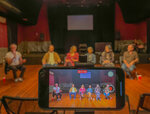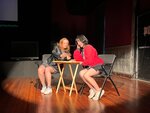The North American Cultural Laboratory (NACL) in Highland Lake, NY is many things, some of which are open to interpretation. Stimulating, thought-provoking, innovative, creative, and above all else …
Stay informed about your community and support local independent journalism.
Subscribe to The River Reporter today. click here
This item is available in full to subscribers.
Please log in to continue |


The North American Cultural Laboratory (NACL) in Highland Lake, NY is many things, some of which are open to interpretation. Stimulating, thought-provoking, innovative, creative, and above all else new, the work presented there is created by folks who challenge the norms of traditional theatrical experiences.
Over the years, I’ve attended a wide variety of “happenings” indoors and out at the NACL. That I might not grasp it all is part and parcel of time spent at the very cool, very old converted church that houses writers, actors, directors and on occasion, scientists. They travel from far and wide to work on new material, hone their craft and share it with those who flock to the place seeking the avant-garde.
Last week I decided to check out the latest NACL offering: “BIOADAPTED.” It’s described on the website as “an interactive theatrical experiment [created] by Transforma Theatre which employs texts about AI, some of which have been generated by GPT-3.”
“Honestly,” I mumbled while scanning the info online, “I don’t even know what GPT-3 is. Guess I should look it up before I go, in hopes that I don’t look like a total numbskull.”
According to the almighty Google, GPT means “generative pre-trained transformer” and is a “large language model released by OpenAI in 2020.” Also, it is a “decoder-only model of deep neural network, which uses attention in place and convolution-based architectures.”
Wait, what?
“BIOADAPTED” is “a re-enactment of investigative documentary with actors portraying real people and scientists, paired with humorous and eerie fictional pieces about what our future might look like if the AI propagates in unethical ways that don’t serve humankind.”
Presented as a work in progress, the folks spending time at the NACL were participating in the Deep Space Residency Program, an ongoing series of presentations which “suppor[t] the development of new work by established and emerging artists and groups who make devised, original, or ensemble performance.” According to the info provided, it “allows artists time and space to experiment—to explore new ideas or dig deeper into ongoing projects—and to refine artistic choices for performance works in various stages of development.”
I joined a band of like-minded individuals seeking creative and intellectual stimulation, and the work was presented as described. We watched the scene study play out and it was (IMHO) well-acted and interesting, but my notebook is filled with questions, hastily scribbled in-between scenes.
I jotted a few of them down, hoping I’d have a chance to ask one or two during the panel discussion following the presentation.
Words like “singularity,” “meta,” “binary” and “simulated consciousness” hung in the air as the guest speakers posed far more questions than answers.
Since time was of the essence, I did not have a chance to ask even one.
If I understood correctly (which is iffy) “BIOADAPTED” addresses the future of artificial intelligence (AI) , its place in society, how far it can go, and the ethics of implanting technology directly into carbon-based life forms like “we mere mortals.” [Ed. note: This is a “Gladiator” reference, Jonathan explained to me when I made a correction. Also it appeared in a number of poems. Who knew? Not me, apparently.]
The panel discussion, moderated by NACL artistic director Brad Krumholz, was lively, but a good deal of the conversation went over my head. I don’t normally consider myself a slouch in the brains department, but in addition to a lot of the technology in question being new, there were a slew of 10-letter words being tossed around that left me feeling totally out of the loop.
Queries like “can AI have feelings?” and “Is it possible for a computer program to have a soul?” left me cold. Haven’t we been asking these questions and those like it, since science- fiction first reared its scary head? Aren’t we just changing the words to fit a new model? What is the “singularity” that strikes fear in the hearts of those who know?
Another glance at my notes revealed that in addition to understanding less than I would have liked, I left feeling like the Google is out to destroy us all, and that maybe life is imitating art after all.
Fearing that terrifying visions of the future—like those depicted in classic sci-fi cinematic nightmares like “Blade Runner” and “Mad Max”—are poised to spring to life, I left the NACL looking over my shoulder, with a renewed fear of Big Brother and an unfamiliar paranoia that’s presently keeping me up at night.
Perhaps that’s the reaction that the Transforma Theatre troupe wishes to elicit from future audiences.
“That’s so meta,” “BIOADAPTED” director Tjaša Ferme said while describing something in the play that I didn’t understand to begin with. And that reminds me—I still don’t know what “meta” means. Maybe I’m a numbskull after all.
North American Cultural Laboratory “provides a haven for artists and ensembles to explore their craft, experiment with new work, and share their investigations in ways that have a profound impact on their practice, the field of performance, and the public.” For more info, go to www.nacl.org
Ask the Google
Q: Can AI threaten humanity?
A: “The possibility of an AI takeover, like the one depicted in ‘Terminator 2,’ is no longer the stuff of science fiction but a real concern that experts in the field are grappling with.” Oy.
Comments
No comments on this item Please log in to comment by clicking here